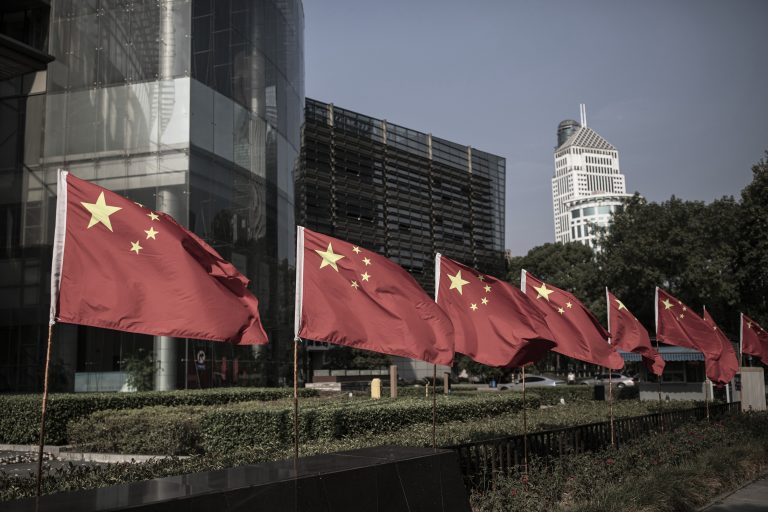Recently the Chinese Communist Party (CCP) has expanded their draconian cultural clampdown to target citizens throughout China, with the employment of uniformed enforcers to repress them. Through multiple bodies of law enforcement, the CCP hopes to keep popular culture in line.
One of the latest manifestations of this is a force dedicated to enforcing Beijing’s wrath upon Chinese media — the wenguan (文管), or “culture enforcers.”
Also called the Cultural Management Law Enforcement Force, its members are tasked to repress China’s cultural agencies and the media, tackling “uncivilized” behavior in areas of culture, tourism, and media production. They crack down on those who supposedly go online to spread pornography, violence, and other content deemed dangerous by authorities.
In the province of Heilongjiang, wenguan enforcers wear dark blue uniforms — adorned with the Chinese characters of “cultural enforcement” — earned during a “uniform dressing ceremony” in the city of Jiamusi on May 30, Radio Free Asia (RFA) reported.
Thirteen municipal cultural market comprehensive enforcement teams in Heilongjiang were also awarded flags by He Jing, director of the Heilongjiang Provincial Department of Culture and Tourism.
Success
You are now signed up for our newsletter
Success
Check your email to complete sign up
“First it was urban management, then agricultural management, and now it’s cultural management. What even is cultural management? If they’re managing poisonous textbooks, OK, I applaud them, but… if it means my Internet has to get in line for a chat…” a netizen commented in a video.
Other groups of enforcement
Aside from the wenguan, the CCP has summoned two more enforcement groups to consolidate its brutal regime, the chengguan (the Urban Management Law Enforcement Force) and the nongguan (the Agricultural Comprehensive Administrative Law Enforcement Force).
The chengguan are assigned to patrol through China’s streets and hunt down suspects with brutality and impunity, a Human Rights Watch report read. Since 2012, it has resorted to “non-criminal urban administrative regulations” and assaults on suspected violators, which has led to “serious injury or death, illegal detention, and unlawful forceful confiscation of property.”
“The chengguan’s abusive conduct turns the idea of rule of law on its head,” Sophie Richardson, China director at Human Rights Watch said, adding that, “Instead of carrying out clearly defined and limited activities to enforce the law, some chengguan are abusing their authority.”
“Chengguan forces have earned a reputation for brutality and impunity,” Richardson added. “They are now synonymous for many Chinese citizens with physical violence, illegal detention, and theft.”
In 2013, the chengguan mobbed and injured a policeman in Qinghai province, after a group were trying to demolish a flower plantation. This came a week after the force killed a watermelon farmer in Hunan province.
“If you didn’t wear this uniform today, we’d beat you to death,” Ren Jinjie quoted the chengguan mobbing him. “When I was sitting in the ambulance, I couldn’t keep myself from crying.”
On June 14, the chengguan assaulted a merchant selling eggs in the city of Neijiang, located in Sichuan province, sparking outrage and a clash between the forces and several angered residents.
Meanwhile, the nongguan emerged earlier this year, attacking farming products like ginger and other “non-essential” crops. In April, the force was responsible for pulling out “forbidden crops” in backyards and fields across the nation in a futile attempt to stabilize China’s food supplies.
“Due to the need to create a civilized environment, the planting of climbing vegetables like beans or melons and squashes in front and backyards is strictly forbidden,” a notice in a village read. “That includes cucumbers, tomatoes, loofahs, pumpkins, zucchini, etc,” the notice added.
READ MORE:
- China Withholds Cremation Data From Public Statistics
- How the Tiananmen Massacre Changed China
- Elon Musk Visits China for First Time Since 2019, Received by Foreign Minister Qin
Political schemes at work
This rise of cultural “enforcers” seemed to come from around 2018, during which the Central Committee of the CCP planned to “integrate and form a comprehensive enforcement team for cultural markets.”
Speaking to RFA, Cai Shengkun, a current affairs commentator in the U.S, said that China’s enforcement team is mainly made to empower political supervision.
“It’s mostly about political considerations,” he said. “They’re trying to comprehensively manage the cultural sphere — including cultural products… performing arts and entertainment.”
Zhang Jianping, a current affairs commentator from Yixing City in the province of Jiangsu, told RFA that China could “lose its vitality” if its reign on cultural management continued.
“There was no security problem or social stability problem in the past when culture was blooming,” Zhang said.














